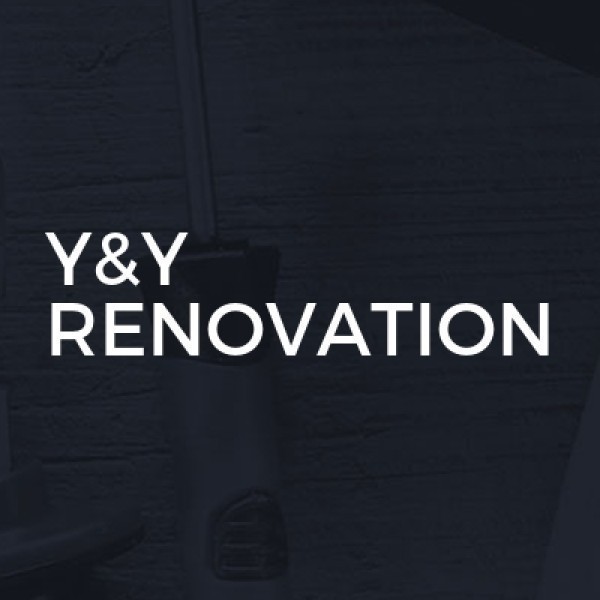Garage Conversions in Derbyshire
Welcome to Edge Construction Services LTD, your premier choice for builders, extension builders, electricians, and property maintenance e... read more »
AK Electrics & Home Improvements is a trusted and reputable business based in Hadfield, proudly serving the Derbyshire a... read more »
S.A.S BUILD PRO is your go-to expert for all your renovation and building needs in the heart of Glossop... read more »
Everlast Construction: Premier Tradespeople in Killamarsh, Derbyshire
Welcome to Everlast Construction, your tru... read more »
Welcome to Podmore Contracting Limited, your premier choice for exceptional construction and landscaping services in Doveridge and throug... read more »
Welcome to NSJ Building & Property Services, your premier choice for Builders, Extension Builders, Property Maintenance, Garage Conversio... read more »
Welcome to Truebond Building Services Ltd, your go-to experts for Extension Builders, Driveway Contractors, D... read more »
Welcome to Secure Carpentry & Renovation Ltd, your go-to experts for home improvement in Overseal and across Derbyshire. As seasoned Exte... read more »
SPL Property Ltd, proudly based in Alfreton, is your premier choice for top-tier building and renovation services across... read more »
Welcome to Y&Y Renovation, your trusted partner for all your building and renovation needs in Normanton and across Derbyshire. Specialisi... read more »
Welcome to Tiger Construction, your premier choice for top-tier construction services in Lane End and throughout Derbyshire. Specialising... read more »
Derbyshire Builders: Your Trusted Partner for... read more »
Midlands Developments Ltd is a premi... read more »
Welcome to AEC Building Services, your trusted partne... read more »
Welcome to DC Renovations, your premier choice for bu... read more »
KH Building Service: Your Trusted Tradespeopl... read more »
National Construction Support Services Ltdread more »
Welcome to Rouses Property Improvements, your go-to e... read more »
Welcome to Rio Contracts Limited, your go-to builders... read more »
Welcome to KAG Brickwork & Construction, your premier... read more »
Search Garage Conversions in Derbyshire by town
Understanding Garage Conversions in Derbyshire
Garage conversions in Derbyshire have become increasingly popular as homeowners seek to maximise their living space without the hassle of moving. Whether you're looking to create a new bedroom, a home office, or a playroom, converting your garage can be a cost-effective and efficient solution. In this article, we'll explore the ins and outs of garage conversions, offering insights into planning, design, costs, and more.
The Benefits of Garage Conversions
Garage conversions offer a myriad of benefits. First and foremost, they provide additional living space without the need for an extension, which can be both time-consuming and expensive. By utilising the existing structure, homeowners can save on construction costs and avoid the complexities of new builds.
Moreover, a well-executed garage conversion can significantly increase the value of your home. In Derbyshire, where property prices are steadily rising, this can be a savvy investment. Additionally, converting a garage can enhance the functionality of your home, providing a tailored space that meets your specific needs.
Planning Permission and Regulations
Before embarking on a garage conversion in Derbyshire, it's crucial to understand the planning permission and building regulations involved. Generally, converting a garage into a living space falls under permitted development rights, meaning you might not need formal planning permission. However, this can vary depending on your property's location and specific circumstances.
Building regulations, on the other hand, are mandatory. These ensure that the conversion is safe, energy-efficient, and habitable. Key areas covered by building regulations include structural integrity, fire safety, insulation, and ventilation. Consulting with a professional or your local council can provide clarity and ensure compliance.
Design Considerations for Garage Conversions
Designing a garage conversion requires careful planning to make the most of the available space. Start by considering the purpose of the new room. Will it be a bedroom, office, or perhaps a gym? Each use will have different requirements in terms of layout, lighting, and storage.
Lighting is a critical aspect, as garages typically have limited natural light. Incorporating windows or skylights can brighten the space and make it more inviting. Additionally, consider the flooring and wall finishes, which should complement the rest of your home while being practical for the room's intended use.
Cost of Garage Conversions in Derbyshire
The cost of a garage conversion can vary widely based on factors such as size, design complexity, and the quality of materials used. On average, homeowners in Derbyshire can expect to pay between £7,000 and £20,000 for a standard single garage conversion.
It's important to budget for unforeseen expenses and consider the long-term value the conversion will add to your property. Hiring a reputable contractor with experience in garage conversions can help ensure that the project stays within budget and meets your expectations.
Choosing the Right Contractor
Selecting the right contractor is crucial for a successful garage conversion. Look for professionals with a proven track record in similar projects and check references or reviews from previous clients. A good contractor will provide a detailed quote, timeline, and outline of the work involved.
Communication is key, so choose someone who listens to your needs and offers solutions that align with your vision. Don't be afraid to ask questions and seek clarification on any aspect of the project.
Common Challenges and How to Overcome Them
While garage conversions are generally straightforward, they can present certain challenges. One common issue is dealing with dampness, as garages are not typically built to the same standards as living spaces. Proper insulation and ventilation are essential to prevent moisture problems.
Another challenge is integrating the converted space with the rest of the home. This can involve matching flooring, paint colours, and architectural details. Planning these elements in advance can help create a seamless transition.
Maximising Space in Your Garage Conversion
Maximising space is a key consideration in any garage conversion. Clever storage solutions, such as built-in shelves or multi-functional furniture, can help make the most of the available area. Consider the room's layout and how you can optimise it for both functionality and aesthetics.
Open-plan designs can create a sense of spaciousness, while partition walls can provide privacy if needed. Tailoring the space to your specific needs will ensure that it serves its intended purpose effectively.
Energy Efficiency and Sustainability
Incorporating energy-efficient features into your garage conversion can reduce utility bills and minimise environmental impact. Insulation is a top priority, as it helps maintain a comfortable temperature year-round. Double-glazed windows and energy-efficient lighting can further enhance the space's sustainability.
Consider using sustainable materials, such as reclaimed wood or eco-friendly paints, to reduce the conversion's carbon footprint. These choices not only benefit the environment but can also add unique character to your new space.
Legal and Insurance Considerations
Before starting a garage conversion, it's wise to review any legal and insurance implications. Inform your home insurance provider of the changes to ensure your policy remains valid. Some insurers may require an updated valuation or additional coverage for the new space.
Additionally, check any legal restrictions or covenants that may apply to your property. These can affect what modifications are permissible and help avoid potential disputes with neighbours or local authorities.
Case Studies: Successful Garage Conversions in Derbyshire
Exploring case studies of successful garage conversions can provide inspiration and insight into what works well. For instance, a family in Derbyshire transformed their unused garage into a vibrant playroom, complete with colourful decor and ample storage for toys.
Another homeowner converted their garage into a stylish home office, featuring custom-built desks and shelving. These examples demonstrate the versatility of garage conversions and the potential to create a space that enhances your lifestyle.
Frequently Asked Questions
- Do I need planning permission for a garage conversion in Derbyshire? Generally, no, but it's best to check with your local council to confirm.
- How long does a garage conversion take? Most conversions take between 4 to 6 weeks, depending on complexity.
- Can I convert a detached garage? Yes, detached garages can also be converted, though they may require additional considerations for utilities and access.
- Will a garage conversion add value to my home? Yes, a well-executed conversion can increase your property's value.
- What are the main building regulations for garage conversions? Key areas include structural integrity, insulation, fire safety, and ventilation.
- How can I ensure my garage conversion is energy-efficient? Focus on insulation, double-glazing, and energy-efficient lighting and appliances.
Future Trends in Garage Conversions
As lifestyles evolve, so too do the trends in garage conversions. Increasingly, homeowners are opting for multi-functional spaces that can adapt to changing needs. For example, a garage conversion might serve as a home office during the day and a guest bedroom at night.
Technological advancements are also influencing design choices, with smart home features becoming more prevalent. From automated lighting to integrated sound systems, these innovations can enhance the functionality and appeal of your converted space.
DIY vs. Professional Garage Conversions
Some homeowners may consider a DIY approach to garage conversions to save on costs. While this can be feasible for those with the necessary skills and experience, it's important to weigh the potential risks and challenges.
Professional contractors bring expertise and knowledge of building regulations, ensuring a high-quality finish and compliance with legal requirements. For most, the peace of mind and assurance of a professional job outweigh the potential savings of a DIY project.
Conclusion
Garage conversions in Derbyshire offer a practical and rewarding way to enhance your living space. By understanding the planning, design, and construction processes, you can create a functional and attractive addition to your home. Whether you choose to tackle the project yourself or enlist the help of professionals, a garage conversion can provide the extra room you need to accommodate your lifestyle and increase your property's value.
















